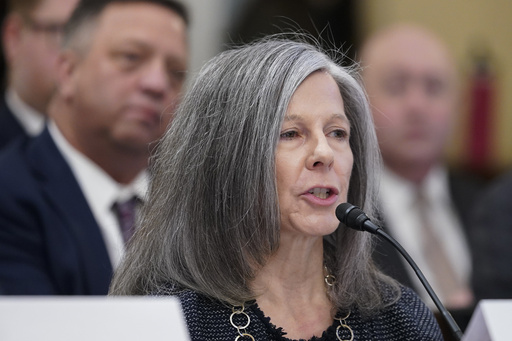**BILLINGS, Mont.** — President Donald Trump has put forward a candidate from the oil and gas sector to lead an agency overseeing approximately 250 million acres of public land, primarily situated in western regions of the country.
Kathleen Sgamma, who serves as the president of the Western Energy Alliance, a trade organization based in Colorado, has been nominated to take on the role of director at the Bureau of Land Management (BLM). This significant position holds considerable sway over land utilization for energy extraction, livestock grazing, recreational activities, and various other purposes. With an educational background from MIT, Sgamma has been a prominent advocate for the fossil fuel sector, often pushing for reduced restrictions on drilling activities in public areas, which contribute around 10% of the nation’s oil and gas supply.
Should the Senate approve her nomination, Sgamma would play a vital role in advancing Trump’s energy policies, particularly the “drill, baby, drill” strategy, in collaboration with Interior Secretary Doug Burgum. This aligns with Trump’s objective of enhancing American energy leadership on a global scale and signifies a distinct shift away from President Joe Biden’s prioritization of climate considerations.
During Trump’s previous administration, former Interior Secretary David Bernhardt moved the BLM’s headquarters to Colorado, resulting in a significant rise in employee turnover. The agency lacked a confirmed director for four years under Trump’s leadership. In contrast, Biden relocated the headquarters back to Washington, D.C., where he appointed Traci Stone-Manning, a conservationist from Montana, to spearhead initiatives aimed at reducing fossil fuel extraction to combat climate change.
Sgamma’s responsibilities will soon involve reversing many of the policies implemented under Stone-Manning’s leadership. This includes implementing a series of directives issued last week by Burgum that aim to aggressively boost fossil fuel development.
Burgum’s orders call for evaluations of several key policies including, but not limited to, increasing the frequency of oil and gas lease sales, halting coal leasing in major coal-rich areas, and revisiting conservation initiatives, especially those protecting the greater sage grouse, a bird species native to Western regions. The directives also include reviewing national monument boundaries set up under Biden and previous administrations, aimed at safeguarding distinctive landscapes and cultural treasures.
In her response to the nomination, Sgamma expressed her gratitude on social media. She praised the BLM’s mission to balance the diverse uses of public land—such as energy development, recreation, grazing, and mining—while also emphasizing land stewardship. “I’m eager to lead an agency that is critical for promoting American energy independence while also preserving our environment,” she stated on LinkedIn.
Nevertheless, her nomination has drawn criticism from environmentalists, who fear that Sgamma’s leadership may prioritize corporate agendas over land conservation efforts. Taylor McKinnon, representing the Center for Biological Diversity, expressed grave concerns, labeling Sgamma as a significant threat to public lands and accusing her of having little regard for environmental laws or the needs of endangered species.
Meanwhile, Wyoming Governor Mark Gordon has welcomed Sgamma’s nomination, considering her qualifications and familiarity with public land usage in Wyoming and other Western states as valuable assets.
Additionally, Trump has put forth Brian Nesvik for the U.S. Fish and Wildlife Service, a segment of the Interior Department responsible for the recovery and habitat protection of endangered species. Nesvik previously directed the Wyoming Game and Fish Department, where he advocated for the lifting of federal protections for grizzly bears, which could lead to public hunting after the population had made a recovery from near extinction.
In the last weeks of the Biden administration, grizzly bear protections were expanded for over 2,000 bears residing near Yellowstone and Glacier National Parks, a decision met with criticism from Republican leaders in Wyoming, Idaho, and Montana.
___
Reporters contributed to this coverage from Washington.




